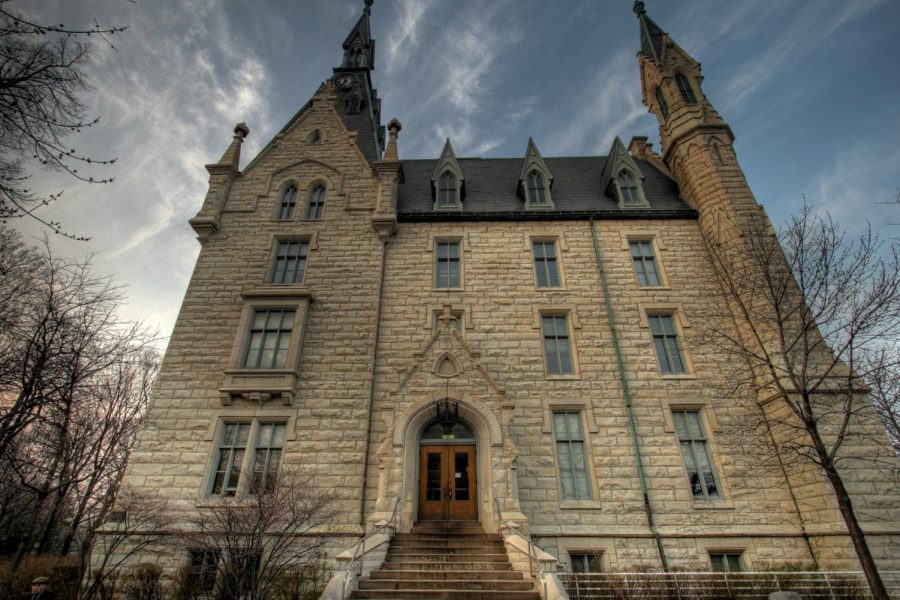Northwestern Protesters: Another Sad Example of Cancel Culture
Madcoverboy at Wikimedia Commons
Protesters at Northwestern University interrupted a speech from Jeff Sessions earlier this month.
November 26, 2019

Controversy struck the idyllic lakeside campus of Northwestern University on Nov. 10. Following an urgent staff meeting, the editors of The Daily Northwestern released an editorial apologizing for posting photos of students protesting former Attorney General Jeff Sessions’s appearance on campus and using the directory to contact students. They claimed this coverage contributed to the “harm” students experienced.
This “harm” resulted from an event where Northwestern University College Republicans brought Sessions in to speak on campus on Nov. 5. As expected, a large group of students protested the event. However, they didn’t just protest; they attempted to disrupt Sessions’s speech. After the attendees entered the lecture hall, protesters entered through a back entrance, attempting to enter the room through windows or barging through the doors. The police forced many of the protesters out, but those who remained disrupted the speech by banging on the doors and shouting into the lecture hall.
The following day, the Daily Northwestern reported on the event. The stories were standard coverage that one would expect of a large event such as Sessions’s appearance and the frantic demonstrations. On Sunday, however, the editors of the Daily decided to release the editorial apologizing for their coverage.
They apologized for reporting. They apologized for doing their job.
They removed photos of the protesters from reporters’ Twitter accounts and then apologized for using a directory to contact the demonstrators for interviews.
The apology resulted from protesters claiming that the images hurt them and invaded their privacy. While the decision to apologize for doing their job is foolish, the journalists’ decision is understandable. Although they had every right to photograph a public demonstration and use a directory to ask those involved for permission to interview them, the student journalists didn’t want to completely ruin their relationships with a select few of their classmates. But the editors’ actions are not the larger problem. It’s the protesters’ handling of the coverage.
The editors called the images “retraumatizing” and “invasive.”
“Invasive” as in the photographer exercising his right under the First Amendment to photograph a public demonstration? “Retraumatizing” as in the protesters seeing photos of a demonstration in which they chose to participate?
These are students at one of the most prestigious universities in America. They understood that under the First Amendment they have the right to peaceably assemble, and they asserted that. They also knew that Sessions had the right to speak, and they denied him that. One of the demonstration organizers, Aishwarya Jois, told the Daily, “We’re exercising our rights to free speech and freedom of assembly, just in the same way as they are asserting their rights to free speech by bringing Jeff Sessions.”
The students knew what they were getting into when they stormed at a wall of police officers blocking the lecture hall. The students knew what they were getting into when they attempted to climb into the room through the windows. The students knew what they were getting into when they pounded on the doors and shouted in hopes of disrupting Sessions’s speech.
They were so confident, strong, and adamant in their behavior on Tuesday. But when Wednesday came, all of a sudden, they were poor little college kids who were being “harmed” by a newspaper simply doing its job and reporting the news. If they were “brave” enough to jeer the police, call the attendees racist, and ask Sessions how many children he’s killed, what happened to that “bravery” the next day when their public actions went… public? Did these social justice warriors decide that they actually didn’t care enough about their beliefs to stand behind them? Did they realize that they might have to face, dare I say it, a consequence?
When people protest, they should proudly stand behind their cause. If they’re too ashamed to publicize their actions and beliefs, then their actions are meaningless and simply a method of throwing a tantrum at someone with whom they disagree. The protesters at Northwestern who asked for their names to be removed from the coverage of the protest discredited their demonstration. Instead of standing behind their beliefs, they cowered behind a skewed interpretation of the First Amendment.
This inability of the students to listen to those that they disagree with and take responsibility for their actions stems from a basic lack of understanding of the First Amendment. People are no longer willing to hold actual discourse with those they disagree with; even though every platform has the right to be heard as long as it coincides with the law and isn’t obscene.
In September, following an ICE protest at Harvard University, the Crimson, the school’s independent newspaper, asked the agency for a comment. This action — required by any standard of journalistic integrity — sparked a petition with over 900 signatures condemning the action. Student groups on campus are actively boycotting the paper because it attempted to provide fair, balanced, and thorough coverage of the protests.
In response to the criticism, the Crimson’s president, Kristine E. Guillame, and managing editor, Angela N. Fu, stated that “a world where news outlets categorically refuse to contact certain kinds of sources — a world where news outlets let third-party groups dictate the terms of their coverage — is a less informed, less accurate, and ultimately less democratic world.”
If people are unable to even listen to the other side of an issue, then democracy is in danger. A fair and independent press is vital to informing the electorate. However, people would now rather go on Twitter and follow accounts that simply preach to their respective choir than read impartial and accurate news. They cast the opposing side as evil and asinine without considering what they have to say.
This issue was none the more prevalent than when Northwestern President Morton Schapiro addressed the debacle. He claimed that he respected NUCR’s right to bring in Sessions, but he questioned whether he was the “right speaker” for a liberal campus such as Northwestern, saying that it is difficult for conservative thought to start actual dialogue on campus. Obviously, Sessions is a controversial figure and protests were inevitable. But Schapiro’s statement is alarming, especially from a university administrator. It sets a tone for an inherent imbalance in freedom of speech on campus. Instead of just accepting that productive dialogue is hard to come by, why don’t the college administrators try to foster an environment that is more conducive to discourse?
These two attacks on student journalists at Northwestern and Harvard have unveiled a perilous threat to democracy. Cancel culture is grooming young people to ignore opposing beliefs rather than collaborate with them. Those on the other side of the political spectrum are cast as lunatics as each side grows more and more tribal.
No matter where someone falls on the political spectrum, as long as their beliefs are legal, they have the right to speak out.
If we cannot accept the First Amendment, we cannot expect the democracy predicated upon it to endure. The First Amendment allows every voice to be heard. This fosters progress that promotes the true common good, not just the desires of the loudest.









Edward Scheidler • Dec 7, 2019 at 11:38 am
Excellent analysis of the event and very well written!
Kelsey Marx • Nov 26, 2019 at 2:01 pm
Beautifully written and spot on, Ryan!